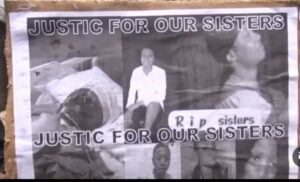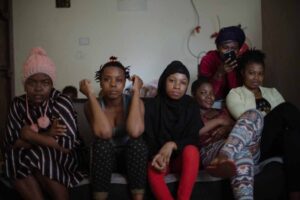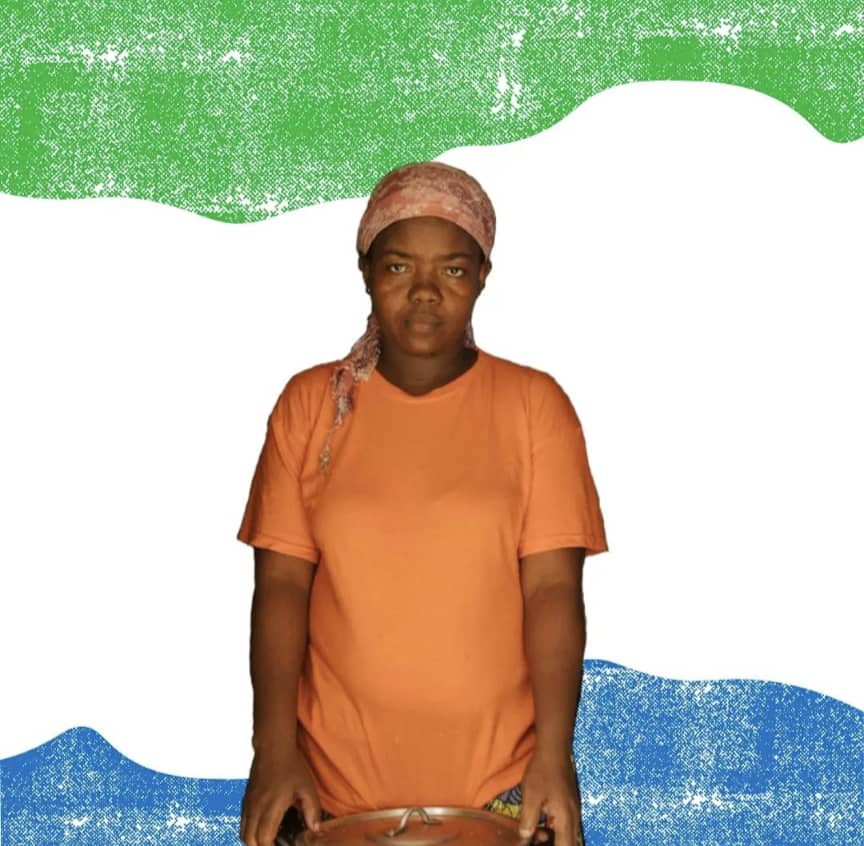On March 11, at least five Sierra Leonean women died in a fire incident at an apartment block in the Sid El Bouchrieh region of Lebanon. Two others are still in critical condition. They were all women who travelled to Lebanon on the promise of various jobs but ended up working as domestic workers. The work they were promised on departure, did not exist. The cause of the fire that killed and injured the women is still unclear as the authorities say they are investigating.
Rugiatu Kargbo, 25 survived the incident through what she described as a narrow escape. As she recounted the incident, Rugiatu became very emotional because she worked and lived with the victims. She considered them her sisters.
“They were everything to me here; we always left for work together and returned together,” she said. She is still traumatized by the incident as she deals with the loss of her compatriots and the shock from her own experience in the incident.
“I have been sick since the incident. It is really not easy for us, and we do not get any help from the consulate. When we call them, we don’t get help.”
Sierra Leone’s consul in Lebanon, Hashim Hashim denied this when he spoke to a TV station in Freetown. He said the consulate had been supporting Sierra Leoneans, some of whom were living in the country illegally.
As they gathered to mourn those who perished in the fire, Rugiatu and other workers also held a protest in front of the Sierra Leone consulate where they demanded justice. They believe that the fire was not an accident. They say they were targeted. There is no evidence to support this claim and the investigations are still ongoing.
The consul, Hashim said they were working with the Lebanese authorities to know what happened, after which the bodies of those that died in the fire will be repatriated.
Lebanon is one of many countries in the Middle East where Sierra Leonean women go to work, and the country has become notorious for its stories of abuse and neglect of foreign workers, especially women who provide maid services in the homes of thousands of Lebanese families.
According to This is Lebanon, a local organisation that supports migrant domestic workers in the country, “the situation of Sierra Leoneans in Lebanon is heartbreaking”.
“This is Lebanon is swamped by cases of Sierra Leoneans who have been trafficked, denied salaries and raped,” the organisation wrote on its official Facebook page.
Rugiatu (mentioned earlier) ventured out to Lebanon in 2022 to find work. After a difficult journey which saw her travel to Accra by road before boarding a flight to Lebanon, she was met with serious abuse at her very first job. Not the kind of welcome she expected.
In an interview with Engage Salone, Rugiatu said she had to run away from her first job because of the ill treatment she received from her “madam”—the employer.
“My madam wasn’t taking care of me. I could not even eat till late in the day and when they gave me food, it would be too little.”
According to Rugiatu, starvation was worsened by the refusal of her employer to pay her salary. She could not endure it anymore.
“They told me that I would only start getting paid after six months. They were just using me. So, I ran away.”
Her “agent”, she said, had promised her that she would earn US$ 200 monthly. When she arrived, the amount was renegotiated to US$ 150 which she said she accepted but even that was not forthcoming, Rugiatu told Engage Salone.
Back in Sierra Leone, Rugiatu was a trader who sold assorted articles at Sani Abacha Street market in Freetown. Like many other migrant workers, she had to save up to pay recruiters for her trip to Lebanon.
Agents are brokers who facilitate the travel and employment of domestic workers. They work with their foreign counterparts who promise young women all sorts of jobs, just for them to arrive and work as domestic workers. Migrant support groups, including This is Lebanon, say agents are not held accountable.
“If we…can change only one thing, we would require that recruiting agents be held accountable. They abuse domestic workers with complete impunity.”

After the fire, Rugiatu moved in with a friend. She is uncertain about her future, not knowing whether she wanted to continue to endure life in Lebanon or return home. Like many other workers, there is nothing to show for their time in the country. After spending so much money to make the journey, there is nothing to return to because many of them are denied salaries and their debts await them at home.
“Kafala costs money”, reads a social media post by DoWan Unite, a local organisation that advocates abolishing the system and empowering former migrant domestic workers who have returned home.
“The Kafala system in Lebanon exploits migrant workers by financially draining them even before they arrive, after which they will be forced to work for less money than originally agreed…” the post continues.
Lucy Turay is the founder of DoWan Unite. A victim of the Kafala system, she returned home to start an organisation that supports former domestic workers like her; and raises awareness about the risks of travelling to the Middle East for work.
In 2019, Lucy was promised a teaching job in Lebanon. After paying agents US$ 1400, she arrived to a maid role. Lucy’s organisation says the Kafala system leaves a lot of women in debt back home and the jobs they end up getting cannot even repay. Many are stuck.
“Sierra Leonean women are forced to pay higher fees and expenses under false pretences, leaving themselves in debt in order to unknowingly be forced into human trafficking and state-sponsored slavery.”
These sad stories of domestic workers from Sierra Leone and around the continent runs across the Middle East—Lebanon, Oman, Kuwait and elsewhere. In September 2022 another organisation that supports migrant workers, Do Bold, released a report that shed light on some disturbing stories of “abuse, exploitation and trafficking” of Sierra Leonean women domestic workers in Oman.
Mariama (not her real name) left Sierra Leone at 24, hoping to find work as a hairdresser in Oman. She told the researchers that she paid her recruiters the equivalent of US$ 500, only for her to work as a domestic worker when she arrived in Oman. Sierra Leonean workers are among the lowest paid in Oman. Employers pay recruiters a fee that far exceeds what the workers get, the report said.

A U.S. State Department report says although Sierra Leone continues to make progress in combatting human trafficking, it still does not meet the minimum standards to eliminate the problem. Failure to investigate reports of corruption and official complicity are among the indicators that Sierra Leone is falling short on, putting the country in the Tier 2 category of the Trafficking in Persons Report 2021.
The Sierra Leone Government has passed the Work Permit and Overseas Employment Act, a law that the labour ministry says will provide a stronger legal framework and guidance for Sierra Leoneans being employed to work overseas.
Speaking recently on a local radio station, labour minister, Alpha Timbo said they had introduced a system to regulate the recruitment of workers from Sierra Leone. There is now a list of registered recruitment agents who are licensed to work in Sierra Leone.
Despite the complaints by Sierra Leonean workers against the consulate in Lebanon, the minister maintained that the consul was doing “extremely well” in looking after the citizens. Regarding the recent fire incident, Timbo said the foreign ministry was in contact with the Lebanese authorities on the matter. Activists have accused the Lebanese authorities of complicity in the abuse of African migrant workers in Lebanon.


